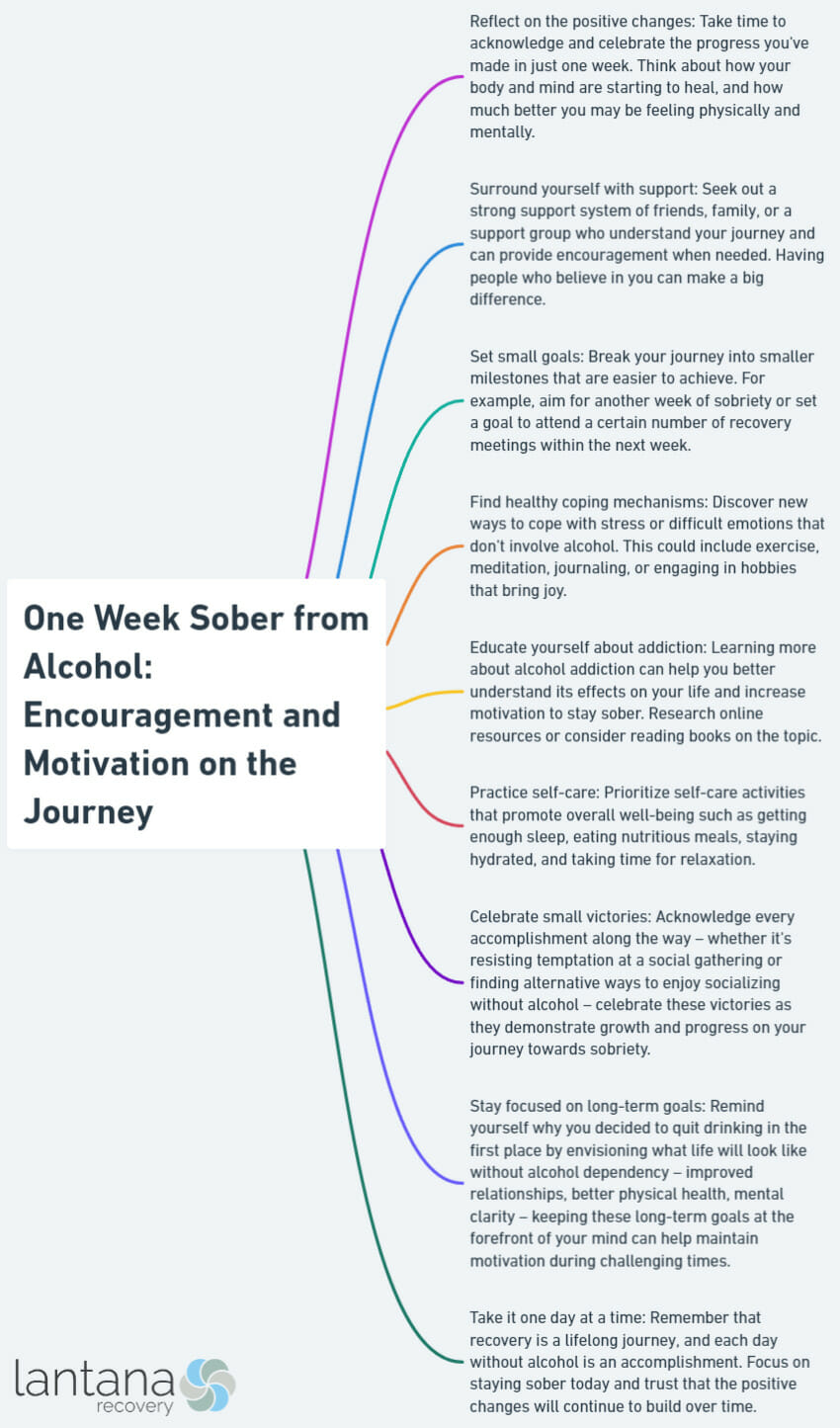The journey to sobriety can be challenging, but the rewards it brings to your overall well-being are immeasurable. Being sober from alcohol has a significant impact on various aspects of your life, from your physical health to your mental and emotional well-being. Studies have shown that prolonged alcohol abuse can lead to serious health issues, including liver damage, cardiovascular problems, and mental health disorders. Choosing a path of sobriety is a crucial step towards reclaiming your health and improving your quality of life.
The journey of being one week sober is particularly significant, as it marks an important milestone in breaking free from alcohol dependency. During this initial week, you may face various challenges, including withdrawal symptoms, cravings, and emotional rollercoasters. However, by staying determined and seeking support, you can navigate through these hurdles and emerge stronger.
The benefits of being one week sober are profound. It is a testament to your strength and resilience, as you begin to experience positive changes in your life. Physically, your body starts to detoxify and heal, leading to improved energy levels, better sleep patterns, and enhanced overall health. Mentally and emotionally, you may find a renewed sense of clarity, reduced anxiety and depression, and improved relationships.
Staying motivated during the first week of sobriety is crucial for long-term success. Surrounding yourself with a supportive network of friends, family, and support groups can provide encouragement and accountability. Celebrating milestones and small victories along the way can boost your motivation and reinforce your commitment to sobriety. Remember, the journey to sobriety is not always easy, but it is worth it. Embrace the positive changes and embrace the life of sobriety for a brighter, healthier future.

The Importance of Being Sober
The importance of being sober cannot be overstated. Living a sober life holds immense significance for both physical and mental well-being.
Being sober is crucial in eliminating the detrimental effects of alcohol on the body. It drastically reduces the chances of liver damage, heart disease, and certain types of cancer. Moreover, it greatly improves the quality of sleep, bolsters the immune system, and amplifies energy levels.
In addition, sobriety has the capability to enhance mental clarity and emotional stability. By refraining from the consumption of alcohol, one can experience improved concentration, memory, and cognitive function. It also serves as a safeguard against mental health disorders such as depression and anxiety.
When it comes to relationships, sobriety plays a vital role in fostering healthier connections. It enables individuals to be fully present and attentive in their interactions, paving the way for enhanced communication and deeper bonds with loved ones.
Furthermore, remaining sober enhances productivity and drives success in various aspects of life. It infuses individuals with increased energy, focus, and motivation, empowering them to pursue both personal and professional goals with unwavering determination.
Last but not least, maintaining sobriety can result in significant financial savings. By eliminating alcohol purchases and associated expenses like dining out and transportation, individuals can attain substantial financial freedom and stability.

Why is being sober from alcohol important for your overall well-being?
Being sober from alcohol is important for your overall well-being. Let’s explore why sobriety is important:
1. Physical health: Being sober helps protect your physical health by preventing liver damage, reducing the risk of cardiovascular diseases, strengthening the immune system, and lowering the chances of developing different types of cancer.
2. Mental well-being: Sobriety positively impacts brain chemistry and enhances cognitive function, memory retention, and decision-making abilities. Additionally, it reduces the likelihood of experiencing mental health issues such as depression and anxiety.
3. Emotional stability: By abstaining from alcohol, you can maintain emotional well-being and prevent mood swings, aggression, and emotional dependency. Sobriety empowers individuals to take control of their emotions and develop healthier coping mechanisms.
4. Personal relationships: Alcohol abuse strains relationships with family, friends, and loved ones. It leads to conflicts, broken trust, and social isolation. Choosing sobriety allows individuals to rebuild and maintain healthy relationships based on trust and mutual support.
5. Financial stability: Consistent alcohol consumption can be costly, especially when it becomes a habit. By choosing sobriety, individuals can save money and allocate those funds towards more fulfilling aspects of life.
6. Improved productivity: Alcohol impairs concentration and productivity, negatively affecting professional life. However, by embracing sobriety, individuals can enhance their focus, energy levels, and overall performance.
7. Better sleep and energy levels: Alcohol disrupts sleep patterns, leading to poor quality sleep and fatigue. However, abstaining from alcohol can result in improved sleep quality and increased energy levels.
Incorporating sobriety into your life is a personal decision that requires commitment and support. Seek out resources and a support network that can provide guidance and motivation on your journey towards a healthier and happier life. Choosing sobriety is a proactive step towards taking control of your overall well-being and embracing positive changes.
The Journey of One Week Sober
The journey of one week sober is both challenging and rewarding. During the first week of sobriety, individuals may experience emotions and physical sensations as their body adjusts to being alcohol-free. The first week of sobriety often involves withdrawal symptoms such as headaches, nausea, and anxiety. These symptoms fade as the body detoxifies from alcohol.
One main challenge during this week is managing cravings. The urge to drink may arise in various situations, especially in social settings or during times of stress. It is important to have coping strategies to stay committed to sobriety.
Another challenge is dealing with the emotional and psychological aspects of alcohol addiction. It takes time to adjust to a new way of life without relying on alcohol to cope with emotions or social situations.
However, the journey of one week sober also brings a sense of accomplishment and empowerment. Each day without alcohol is a step towards improved well-being. It is important to seek support during this journey. Friends, family, and support groups can provide encouragement and motivation to stay committed to sobriety goals.
Celebrating milestones and victories along the way boosts confidence and reinforces positive changes brought by sobriety. By completing the first week sober, individuals start experiencing benefits. These benefits include improved sleep, increased energy levels, enhanced mental clarity, and renewed self-control.
The journey of one week sober marks the beginning of a transformative process towards a healthier and happier life, free from alcohol addiction.
What does the first week of sobriety look like?
The first week of sobriety is a challenging journey towards a healthier life. During this week, individuals experience physical, emotional, and psychological changes as their body adjusts to life without alcohol.
One common physical change during the first week of sobriety is withdrawal symptoms. These can include nausea, headaches, insomnia, anxiety, and irritability. The severity and duration of these symptoms vary depending on the individual’s level of alcohol dependency and overall health.
Emotionally, individuals may experience mood swings as their brain chemistry readjusts to functioning without alcohol. They may feel a mix of emotions, ranging from intense cravings and frustration to moments of clarity and hope.
Psychologically, individuals may struggle with breaking old habits and coping mechanisms revolving around alcohol. This week requires self-reflection, self-discipline, and determination to push through cravings and triggers.
Seeking support from friends, family, and support groups is essential during the first week of sobriety. Connecting with others who have gone through a similar journey can provide valuable encouragement and guidance. Celebrating milestones and small victories can also serve as motivation to continue on the path to sobriety.
While the first week of sobriety is difficult, it is also filled with hope and the potential for positive change. By persevering through challenges, individuals lay the foundation for a healthier, happier, and more fulfilling life without alcohol.
“We show that these communities provide access to an experienced and accessible support group whose discussions include consequences, reflections, and celebrations.” (“I Will Not Drink With You Today”: A Topic-Guided Thematic Analysis of Addiction Recovery on Reddit, Gauthier et al., 2022)
What are the challenges faced during the initial week?
During the initial week of sobriety, individuals may face various challenges. Common challenges include withdrawal symptoms, cravings, emotional instability, and social pressure.
1. One major challenge during the initial week of sobriety is dealing with withdrawal symptoms. These symptoms, such as headaches, nausea, tremors, anxiety, and insomnia, can be both physical and psychological. It’s important to remember that these symptoms are temporary and will subside with time.
2. Another challenge is coping with intense cravings for alcohol. These cravings can be triggered by factors like stress, boredom, or social situations. Having a plan to cope with cravings is crucial. This can involve engaging in alternative activities, practicing mindfulness techniques, or seeking support.
3. Sobriety can also bring about emotional instability. Mood swings, irritability, and heightened emotions are common during this time. It’s important to be aware of these feelings and find healthy ways to cope. Seeking support or engaging in stress-reducing activities like exercise or therapy can be beneficial.
4. Social situations can be challenging during the initial week of sobriety. Attending events where alcohol is present may lead to feelings of isolation or discomfort. Communicating sobriety goals to friends and family, seeking supportive environments, and having a plan for handling social situations involving alcohol is crucial.
5. One challenge that arises when removing alcohol from one’s life is the lack of routine. This can be difficult as individuals may need to find new ways to fill their time and cope with boredom. Developing new hobbies, creating a structured daily schedule, or seeking professional guidance can help in establishing a new routine.
Remember, seeking professional help and reaching out to support networks can greatly enhance the chances of successfully navigating through the challenges faced during the initial week of sobriety.

The Benefits of One Week Sober
The benefits of staying sober for one week can have a significant impact on both physical and mental well-being. During this period, several positive changes can occur, providing various advantages to individuals.
How does being sober for one week positively impact your life?
Being sober for one week can have a positive impact on various aspects of your life. Here are some positive changes that can occur:
-
Improved Physical Health: After just one week of sobriety, your body starts to recover from the harmful effects of alcohol. Your liver detoxifies and regenerates more efficiently, leading to improved liver function and a decreased risk of liver diseases.
-
Enhanced Mental Clarity: Alcohol consumption impairs cognitive function and affects your ability to think clearly. However, staying sober for a week allows your brain to regain focus and concentration. You may experience improved memory, better problem-solving skills, and increased mental sharpness.
-
Boosted Energy Levels: Alcohol can cause fatigue and lethargy. By abstaining from alcohol for a week, you can increase your energy levels and overall vitality. This can lead to increased productivity and motivation in various aspects of your life.
-
Strengthened Relationships: Alcohol misuse often strains relationships with family, friends, and loved ones. However, staying sober for a week can help rebuild trust, repair damaged connections, and foster healthier, more meaningful relationships.
-
Financial Savings: Excessive drinking can strain your finances. By abstaining from alcohol for a week, you can save a significant amount of money that can be used for other purposes or savings.
-
Improved Sleep Quality: Alcohol disrupts sleep patterns and negatively impacts sleep quality. However, staying sober for a week can improve your sleep, increase REM sleep, and overall restfulness.
Remember, the positive impacts of sobriety continue to grow with longer periods of abstinence. So, why not try being sober for a week and experience these positive changes yourself?

Encouragement and Motivation on the Journey
Embarking on the journey of sobriety can be challenging, but you’re not alone. In this section, we’ll discover the encouragement and motivation you need to stay strong. From practical tips for navigating the first week of sobriety to the importance of seeking support from friends, family, and support groups, we’ll explore the tools that will help you succeed. Along the way, we’ll also learn the power of celebrating milestones and small victories. So, let’s dive in and find the inspiration that will keep you going on this incredible journey.
Tips for staying motivated during the first week of sobriety
During the initial seven days of sobriety, it can be a challenge to maintain motivation and keep your focus on your goal. However, implementing effective strategies can greatly enhance your chances of success. Here are some essential tips to help you stay motivated during the first week of your journey towards sobriety:
1. Define your objectives clearly: Determine why you want to quit drinking and what you aim to accomplish on your path to sobriety. Establishing specific and measurable goals will assist in sustaining your motivation.
2. Seek support from a network: Surround yourself with understanding and supportive individuals who endorse your decision to remain sober. Look for encouragement from friends, family, or support groups.
3. Live one day at a time: Instead of overwhelming yourself by forever forsaking alcohol, concentrate on staying sober each day. Celebrate every sober day as a small triumph.
4. Recognize triggers: Identify the situations, people, or emotions that may entice you to drink. Develop strategies to avoid or cope with these triggers, such as exploring new hobbies or practicing relaxation techniques.
5. Nurture self-care routines: Prioritize activities that promote your physical and mental well-being. Engage in regular exercise, practice mindfulness, ensure adequate rest, and nourish your body with wholesome foods.
6. Reward your progress: Acknowledge and reward yourself for your accomplishments and hard work by indulging in small pleasures or treats. It could be as simple as enjoying a favorite meal or indulging in a movie.
By adhering to these suggestions, you can stay motivated and maintain your focus throughout the first week of your sobriety journey. Remember, choosing to stay sober is a significant step towards a healthier and happier life.
Seeking support: friends, family, and support groups
Seeking support is crucial on your journey to being one week sober from alcohol. Here are some ways friends, family, and support groups can help:
– Friends: Surround yourself with supportive friends who encourage and hold you accountable to your sobriety goals. They can also participate in alcohol-free activities with you, creating a social environment that aligns with your new lifestyle.
– Family: Lean on your family for emotional support during this challenging time. They can provide a stable and understanding environment, helping you navigate triggers and temptations. Open and honest communication with your family members can strengthen your bond and create a safe space for discussing your journey.
– Support groups: Joining groups like Alcoholics Anonymous (AA) or SMART Recovery can be immensely beneficial. These communities provide a network of individuals experiencing similar struggles, allowing you to share your challenges and successes. Through group discussions, you can gain insights, receive guidance, and learn effective coping strategies from others who have overcome alcohol addiction.
Remember, seeking support from friends, family, and support groups greatly enhances your chances of maintaining sobriety. These individuals and communities offer the empathy, understanding, and solidarity you need during this transformative journey.
Do not add any more lines to the text.
Celebrating milestones and small victories
Celebrating milestones and small victories is crucial to staying motivated and maintaining progress on the journey of sobriety. Here are some reasons why celebrating these moments is important:
-
Motivation boost: Recognizing and celebrating milestones and small victories provides a significant boost of motivation. It reminds individuals of the progress they have made, increasing confidence and determination to continue on the path of sobriety.
-
Positive reinforcement: Celebrations act as positive reinforcement, reinforcing the positive behaviors and choices made during the journey. This helps solidify the commitment to sobriety and encourages further growth.
-
Self-care and self-love: Celebrating milestones and small victories is an act of self-care and self-love. It allows individuals to acknowledge their achievements and appreciate the effort they have put into their sobriety journey.
-
Builds a support system: Celebrations involve sharing these moments with loved ones, friends, or support groups, strengthening relationships and building a support system. It creates an opportunity for others to acknowledge and celebrate the individual’s progress, fostering a sense of belonging and encouragement.
-
Increases resilience: Celebrating milestones and small victories helps individuals develop resilience in the face of challenges. By recognizing their progress and achievements, individuals are better equipped to navigate obstacles and setbacks, reminding themselves of their ability to overcome difficulties.
Remember, celebrating milestones and small victories is an essential part of the journey towards sobriety. Whether it’s marking a week, a month, or a year of sobriety, or acknowledging small achievements along the way, taking the time to celebrate these moments can have a significant impact on overall well-being and continued success in maintaining sobriety.

The Long-Term Benefits of Sobriety
The long-term benefits of sobriety are numerous and significant. Making the decision to abstain from alcohol can have a profound positive impact on both physical and mental well-being, while also improving relationships and allowing for personal growth.
1. Physical well-being: Choosing sobriety has direct positive effects on physical health. By eliminating alcohol consumption, individuals can experience improved liver function, a reduced risk of chronic diseases such as liver cirrhosis and cancer, as well as a strengthened immune system. Additionally, abstaining from alcohol leads to better sleep patterns, increased energy levels, and a healthier complexion.
2. Mental health: Sobriety plays a crucial role in promoting mental clarity and emotional stability. Alcohol consumption often leads to mood swings, anxiety, and depression. By staying sober, individuals can experience improved mental focus, reduced anxiety levels, and increased emotional resilience. Sobriety also enhances decision-making skills and cognitive function.
3. Relationships: Sobriety is essential for strengthening relationships with friends, family, and loved ones. Alcohol abuse often strains relationships, causing conflicts and disconnection. By choosing sobriety, individuals can rebuild trust, foster healthier communication, and cultivate deeper, more meaningful connections with others.
4. Personal growth: Sobriety opens up a world of opportunities for personal growth and self-discovery. It allows individuals to develop healthier coping mechanisms, explore new hobbies and interests, and set and achieve personal goals. Sobriety also paves the way for new experiences and opportunities that may have been hindered by alcohol dependency.
Incorporating sobriety into one’s life brings about substantial and enduring benefits. By prioritizing long-term sobriety, individuals can experience improved physical and mental well-being, stronger relationships, and personal growth.
How does sobriety bring long-lasting positive changes to your life?
Sobriety brings long-lasting positive changes to your life by enhancing your well-being in various ways. Here are the ways in which being sober can improve your overall health and happiness:
-
Improved physical health: By abstaining from alcohol, your body heals from its damaging effects. This allows you to reduce the risk of liver disease, heart problems, and various cancers. Additionally, your immune system becomes stronger, making you less susceptible to illnesses.
-
Enhanced mental well-being: Alcohol can exacerbate mental health issues such as anxiety and depression. However, by choosing sobriety, you give your mind the chance to heal and improve. This leads to increased mental clarity, improved focus, and enhanced cognitive function.
-
Strengthened relationships: Excessive alcohol consumption can strain relationships with loved ones. Nevertheless, by embracing sobriety, you have the opportunity to rebuild trust and foster healthier connections. This empowers you to better support your family and friends and engage in more meaningful interactions.
-
Achieve financial stability: Excessive drinking often places a significant financial burden on your life. However, by eliminating alcohol expenses, you can save money and allocate it towards more fulfilling endeavors. This could include pursuing hobbies, traveling, or investing in your future.
-
Improved self-esteem and personal growth: Sobriety enables you to regain control and develop a sense of self-worth. Without relying on alcohol, you can cultivate healthier coping mechanisms and face life’s challenges with resilience. This ultimately leads to personal growth, greater self-confidence, and a more positive outlook on life.
By embracing sobriety, you can experience these long-lasting positive changes that significantly improve your well-being and quality of life.
Fact: Studies have shown that individuals who maintain long-term sobriety are more likely to report increased life satisfaction and overall happiness compared to those who continue to drink excessively.
Additional Resources and Quotes
When embarking on the path to sobriety, it is crucial to have access to additional resources and quotes for support and guidance. Here are some valuable resources and quotes that can aid you in your first week of sobriety:
1. Support groups: Joining Alcoholics Anonymous (AA) or SMART Recovery can connect you with individuals who comprehend your struggles and can offer support.
2. Therapy and counseling: Seeking professional help from addiction specialists can be highly beneficial. They can equip you with the necessary tools to overcome challenges and maintain your sobriety.
3. Self-help books: Numerous books provide insights, strategies, and personal stories of recovery. Notable titles include “The Unexpected Joy of Being Sober” by Catherine Gray and “This Naked Mind” by Annie Grace.
4. Online forums and communities: Engaging with online communities centered around sobriety can provide invaluable support. Websites such as Soberistas and r/stopdrinking on Reddit are exceptional platforms to connect with others on the same journey.
5. Inspirational quotes: Motivational quotes can serve as daily reminders and encouragement. One inspiring quote is, “Sobriety is not solely about abstaining from alcohol; it is about rediscovering oneself and embracing a brighter future.“
Remember, these additional resources and quotes can assist you in maintaining sobriety not just during the first week but also beyond. Surround yourself with supportive individuals and make use of the available tools to remain resolute on your path towards a healthier and happier life.
Frequently Asked Questions
1. How can seeking treatment help with sustaining sobriety?
Seeking treatment, such as a twelve-step program or holistic treatment, can provide essential activities and structured support to keep a person sober. Treatment programs offer comprehensive sobriety strategies and help individuals strengthen their recovery.
2. What role do sobriety quotes play in the journey to recovery?
Sobriety quotes serve as a source of encouragement and motivation, redirecting thinking in a balanced and realistic light. They can help individuals stay strong and focused on their goal of overcoming alcoholism, reminding them of something bigger than themselves.
3. How can admitting faults and asking for help contribute to staying sober?
Owning one’s part in their alcohol problem and seeking alcoholism treatment are crucial steps in sustaining sobriety. Admitting faults and asking for help from professionals and support groups enable individuals to develop a personalized and individualized treatment plan.
4. What role do spiritual practices play in maintaining sobriety?
Spiritual practices can provide individuals with a sense of purpose and help cope with conflicts, promoting serenity and emotional well-being. Engaging in spiritual practices can strengthen recovery and provide a foundation for maintaining sobriety.
5. How can love and support contribute to the journey of sobriety?
Feeling loved and supported by others is crucial for individuals in their recovery journey. Having a strong support system can provide encouragement, accountability, and a sense of belonging, reminding individuals that they are no better and no less than anyone else.
6. How does a comprehensive alcohol detox program help with achieving and sustaining sobriety?
A comprehensive alcohol detox program, such as the one offered by Shadow Mountain Recovery, provides medically supervised withdrawal and manages severe withdrawal symptoms. This program ensures a safe and structured approach to quitting drinking, setting individuals on the path to achieving long-term sobriety.
The post One Week Sober from Alcohol: Encouragement and Motivation on the Journey appeared first on Lantana Recovery: Addiction Treatment Rehab Center.
source https://lantanarecovery.com/one-week-sober-from-alcohol-encouragement-and-motivation-on-the-journey/
No comments:
Post a Comment